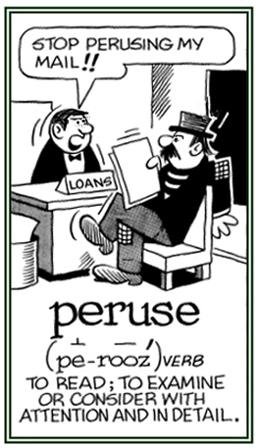us-, ut-
(Latin: use, employ, practice)
It may be a losing battle; however, it is worth pointing out that peruse does not mean to look over casually, but to read or to examine carefully.
2. To examine in detail, in order to learn; to look at with attention: The teacher assigned the class to peruse the complex chapter carefully in the biology book.The group of artists perused the paintings in the art exhibit.
4. To read carefully and with close attention, as a demanding or complicated text that requires concentration and effort: Andrew said he would sign the contract after his lawyers completely perused it in great detail, and found out if it was fair and worth paying for.5. A term that some people consider to be pompous and stilted in business correspondence: Peruse shouldn't be used merely as a fancy substitute for read.
Some writers misuse the verb peruse as if it means "to read quickly" or "to scan", like the following example shows: Kevin took off his sunglasses and quickly perused or skimmed through the stack of documents, asked a few questions, and then signed several of them.
Peruse has meant "to read thoroughly" for a long time; however, now it is often used loosely when people should use the word "read" instead.
Sometimes people use it to mean "to glance over, to skim," as in "We only had a minute to quickly peruse the manual, but this kind of usage is still considered an error by many linguistic specialists.

Go to this Word A Day Revisited Index
so you can see more of Mickey Bach's cartoons.
2. To look at or to read something in an informal, casual, leisurely, or relaxed way; sometimes believed to be misleading or incorrect: Manfred decided to peruse the newspaper during his break while he enjoyed a snack.
2. To proceed or to follow: Shanna and Sherman were determined to pursue a course directly across the snowy field in order to get to their winter lodge.
3. To haunt or to afflict: The nightmares continued to pursue Trudy after having witnessed the horrible boating accident.
4. To be involved in: After his retirement, Norman was very happy to pursue his hobby of fishing.
5. To chase or to follow something in order to overtake, capture, or to kill it: The hunter spent a long time in an effort to pursue the deer in the forest so he could shoot it and return home with venison for his family.
Glenn wants to pursue a career in library sciences because it will make it possible for him to peruse the newest books and magazines.
"The editor of the lexicon insisted that his staff reperuse the word entries that they were working on before they submitted them for final inclusions in the dictionary."
2. Operable; functional: Clive's car was usable because it had been repaired at the garage the other day.
3. Practical and convenient for utilizing: The classroom was large enough to be usable by all the students with enough desks for everyone.
2. The act of employing something; the established custom of using language and contexts correctly: The usage of your debit card is really important in many aspects of life.
If Günter in Germany wants to use the correct words in his English essay, he should consult a good book on English usage.


